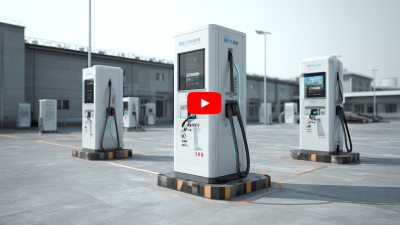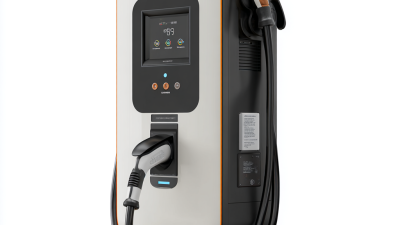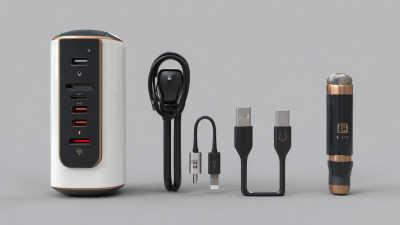7 Best Home Charging Points for Electric Vehicles to Consider in 2023
As the adoption of electric vehicles (EVs) continues to surge, with a reported 54% increase in global EV sales in 2021 alone, the importance of having a reliable Home Charging Point has never been greater. According to the International Energy Agency, electric vehicle sales are expected to exceed 145 million units by 2030, highlighting the urgent need for accessible charging solutions.

The convenience of charging at home not only alleviates the anxiety of limited public charging infrastructure but also offers significant cost savings compared to traditional fueling methods. As we move further into 2023, now is the perfect time for EV owners and potential buyers to consider the best Home Charging Points that enhance efficiency and meet diverse needs, ensuring that charging remains seamless and convenient in their everyday lives.
Top Features to Look for in Home EV Charging Stations
When selecting a home EV charging station, several key features should guide your decision. First and foremost, charging speed is critical. The industry standard for residential Level 2 chargers ranges from 3.7 kW to 22 kW. According to a recent report by the International Energy Agency, faster charging stations can fully recharge an electric vehicle in as little as 4-6 hours, significantly reducing downtime compared to standard outlets.
Another vital aspect is safety features. Opting for a charging station that includes built-in protections against overcurrent and short circuits will ensure both your vehicle and home are safeguarded. Additionally, smart technology integration can provide remote monitoring and control, allowing you to optimize charging times to take advantage of lower energy rates. Data from the U.S. Department of Energy indicates that consumers can save up to 20% on their energy bills by charging during off-peak hours.
Tip: Always check the compatibility of the charging station with your specific electric vehicle model to avoid issues and ensure efficient charging. Tip: Consider a unit with an energy management system, enabling you to track charging habits and power usage, ultimately contributing to a greener lifestyle.
Comparison of Charging Speeds: Level 1 vs. Level 2 Chargers
When considering home charging solutions for electric vehicles, understanding the differences between Level 1 and Level 2 chargers is essential. Level 1 chargers use a standard 120-volt outlet, making them convenient for overnight charging. However, they typically deliver around 3 to 5 miles of range per hour, which can be insufficient for most EV owners who rely on their vehicles for daily commutes. In contrast, Level 2 chargers require a 240-volt outlet and significantly increase charging speeds, offering an average of 25 miles of range per hour. This faster charging capability makes Level 2 units the preferred choice for those who want to minimize downtime and maximize convenience.
Recent statistics reveal that long charging times are increasingly frustrating consumers, particularly as electricity costs rise. This reflects a growing need for effective home charging solutions that can meet the demands of modern electric vehicle ownership. The availability of portable EV chargers adds another layer of flexibility, allowing drivers to recharge their vehicles faster and smarter wherever they may be. As the landscape of EV charging continues to evolve, selecting the right type of charger is crucial for enhancing the ownership experience and alleviating concerns associated with home charging speeds.
Cost Considerations: Pricing Your EV Charging Solution
When selecting a home charging point for electric vehicles (EVs), cost considerations play a crucial role in making the right investment. The average cost of a Level 2 home charging station typically ranges from $400 to $700, not including installation fees. According to a 2022 report by the U.S. Department of Energy, the installation costs can add an additional $300 to $1,200, depending on factors such as electrical capacity upgrades or the distance to the electrical panel. Budgeting for both the equipment and the installation is essential for homeowners looking to transition to electric mobility efficiently.
Moreover, the potential long-term savings associated with charging at home compared to conventional fuel sources can significantly offset these initial costs. A study by the Electrification Coalition indicates that EV owners can save anywhere from $800 to $1,200 annually on fuel and maintenance when they charge at home. Furthermore, with the increasing number of utilities offering incentives and rebates for home EV chargers, the overall expense can further diminish. Planning these costs against the backdrop of potential savings ensures that consumers not only invest wisely but also benefit from a sustainable and cost-effective transition to electric vehicle ownership.
Cost Comparison of the 7 Best Home Charging Points for Electric Vehicles (2023)
Ease of Installation: Choosing Chargers that Fit Your Home
When selecting an electric vehicle (EV) charging point for your home, ease of installation is a critical factor. According to a report by the International Energy Agency (IEA), nearly 70% of EV owners prefer to install a home charging station to maximize convenience. However, the installation process can vary widely based on your home’s infrastructure. For example, homes with existing electric vehicle supply equipment (EVSE) may only require simple upgrades, saving both time and costs.
A study from the National Renewable Energy Laboratory (NREL) indicates that charging stations specifically designed for residential areas can reduce installation complexities by up to 40%. These chargers often come with user-friendly features like plug-and-play compatibility and self-diagnostic capabilities. Furthermore, they are often compact and aesthetically designed, allowing homeowners to integrate them seamlessly into their garage or driveway space without significant modifications. The right choice not only enhances accessibility but also aligns with the growing trend of smart home technologies, propelling your charging experience into the future.
7 Best Home Charging Points for Electric Vehicles to Consider in 2023 - Ease of Installation
| Charging Point | Power Rating (kW) | Installation Ease | Features | Price Range ($) |
|---|---|---|---|---|
| Model A | 7.2 | Easy | Smart connectivity, compact design | 500 - 700 |
| Model B | 3.7 | Very Easy | Portable and lightweight | 300 - 500 |
| Model C | 11 | Moderate | Integrated app features, Wi-Fi enabled | 700 - 900 |
| Model D | 22 | Challenging | High-speed charging, rugged exterior | 1000 - 1200 |
| Model E | 7.2 | Easy | User-friendly interface, timer settings | 500 - 800 |
| Model F | 3.0 | Very Easy | Compact size, great for apartments | 200 - 400 |
| Model G | 11 | Moderate | Multiple connection options | 800 - 1000 |
Smart Charging Technology: Enhancing Convenience and Efficiency
In 2023, smart charging technology for electric vehicles (EVs) is transforming the way we think about home energy management. With the rise of connected devices, these charging points not only charge vehicles but also integrate seamlessly with home networks, allowing users to monitor and manage their energy consumption more effectively. Smart chargers can communicate with your EV to determine the optimal charging times based on electricity rates, which can lead to significant savings on energy bills.
Moreover, the convenience offered by smart charging technology is unparalleled. Many models come equipped with mobile applications that enable users to initiate and stop charging remotely, schedule charging sessions during off-peak hours, and receive notifications when charging is complete. Some advanced systems even use artificial intelligence to learn your charging habits and adjust their operations for maximum efficiency. As the demand for sustainable energy solutions grows, investing in these smart home charging points not only enhances the performance of your electric vehicle but also contributes to a more energy-efficient household.
Related Posts
-

How to Optimize Your Electric Charging Points for Maximum Efficiency and User Satisfaction
-

Exploring Innovative Alternatives to Best Car Charging Stations for Global Purchasers
-

Quality Driven Chinese Manufacturing of Market Leading Electric Charging Solutions
-

What Makes the Best Chargepoint Ev Charger Essential for Global Buyers
-

How to Identify Top Manufacturers for the Best Ev Charger Solutions
-

China's Premier Manufacturing of Best Portable Electric Car Chargers for Global Markets
